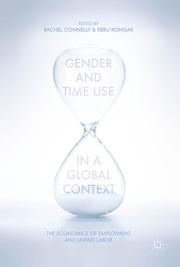-
Zusatztext
-
This edited volume uses a feminist approach to explore the economic implications of the complex interrelationship between gender and time use. Household composition, sexuality, migration patterns, income levels, and race/ethnicity are all considered as important factors that interact with gender and time use patterns. The book is split in two sections: The macroeconomic portion explores cutting edge issues such as time poverty and its relationship to income poverty, and the macroeconomic effects of recession and austerity; while the microeconomic section studies topics such as differences by age, activity sequencing, and subjective well-being of time spent. The chapters also examine a range of age groups, from the labor of school-age children to elderly caregivers, and analyze time use in Argentina, Australia, Canada, China, Finland, India, Korea, South Africa, Tanzania, Turkey, and the United States. Each chapter provides a substantial introduction to the academic literature of its focus and is written to be revealing to researchers and accessible to students and policymakers.
-
-
Kurztext
-
This edited volume uses a feminist approach to explore the economic implications of the complex interrelationship between gender and time use. Household composition, sexuality, migration patterns, income levels, and race/ethnicity are all considered as important factors that interact with gender and time use patterns. The book is split in two sections: The macroeconomic portion explores cutting edge issues such as time poverty and its relationship to income poverty, and the macroeconomic effects of recession and austerity; while the microeconomic section studies topics such as differences by age, activity sequencing, and subjective well-being of time spent. The chapters also examine a range of age groups, from the labor of school-age children to elderly caregivers, and analyze time use in Argentina, Australia, Canada, China, Finland, India, Korea, South Africa, Tanzania, Turkey, and the United States. Each chapter provides a substantial introduction to the academic literature of its focus and is written to be revealing to researchers and accessible to students and policymakers.
-
-
Autorenportrait
- Rachel Connelly is the Bion R. Cram Professor of Economics at Bowdoin College, USA. Her recent research examines time use in the US, particularly as it relates to child caregiving, and the relationships between family structure, age, migration, and time use in China. She is an Associate Editor of Feminist Economics. Ebru Kongar is Associate Professor of Economics at Dickinson College, USA. Her research focuses on the gendered time use and labor market outcomes of macroeconomic developments, such as deindustrialization, offshoring, and the Great Recession in the US economy. She is an Associate Editor of Feminist Economics. Contributor Affiliations:Rania Antonopoulos, Alternate Minister for Labour, Greece; Levy Economics Institute, USALourdes Benería, Cornell University, USAJudith E. Brown, University of New South Wales, AustraliaRebecca M. Centanni, Analysis Group, Boston, USALyn Craig, University of New South Wales, AustraliaDeborah S. DeGraff, Bowdoin College, USAEsther W. Dungumaro, University of Dar es Salaam, TanzaniaValeria Esquivel, Food and Agriculture Organization of the United NationsMaria S. Floro, American University, USAErofili Grapsa, Rhodes University, South AfricaIpek Ilkkaracan, Istanbul Technical University, TurkeyJiweon Jun, University of Oxford, UKCharlene Kalenkoski, Texas Tech University, USADeborah Levison, University of Minnesota, USAFiona MacPhail, University of Northern British Columbia, CanadaThomas Masterson, Levy Economics Institute, USAMargaret Maurer-Fazio, Bates College, USAEmel Memis, Ankara University, TurkeyJulie A. Nelson, University of Massachusetts Boston, USADorrit Posel, University of the Witwatersrand, South AfricaMark Price, Keystone Research Center, USASmriti Rao, Assumption College, USAEsther D. Rothblum, San Diego State University, USAJill Rubery, European Work and Employment Research Centre, UKAbhilasha Srivastava, American University, USALyndall Strazdins, The Australian National University, AustraliaAjit Zacharias, Levy Economics Institute, USA
Detailansicht
Gender and Time Use in a Global Context
The Economics of Employment and Unpaid Labor
ISBN/EAN: 9781137568366
Umbreit-Nr.: 847947
Sprache:
Englisch
Umfang: XXIII, 505 S., 24 s/w Illustr., 505 p. 24 illus.
Format in cm:
Einband:
gebundenes Buch
Erschienen am 11.07.2017
Auflage: 1/2017


